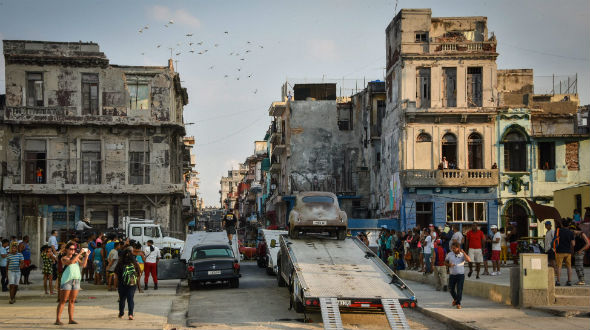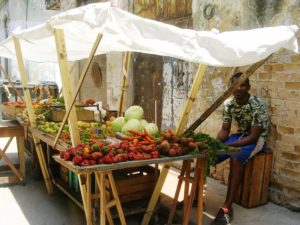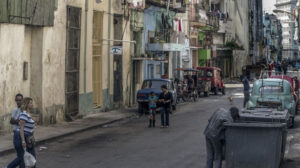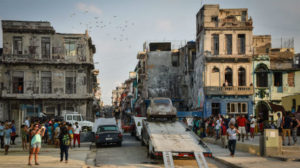When the Soviet Union collapsed in the early 1990s, Cubans suffered tremendously. Gasoline shortages forced people to turn to horse and cart. Food shortages for huge swathes of the population led to severe medical problems. Wages collapsed to lows that have hardly recovered since. For Cubans, the lesson was that outsiders are a necessary evil that are missed when they’re gone.
The Cuban solution to the end of Soviet support has been a gradual opening to tourism. The process has been halting, with developments often reversed when other forms of support emerge. For example, when Cuba’s cozy relationship with Venezuela led to an influx of cheap energy, the island lost focus on tourism. But when the Venezuelan economy collapsed, Cuba again began promoting tourism. Yet, the strategy is not a magic bullet.
The foreign exchange provided by tourists is by definition more valuable than the local pesos in which wages are paid. (The Cuban government has created two separate currencies, CUCs, which are used by tourists, and CUPs, which are used by Cubans.) This means that it is more lucrative to drive a taxi than to be a university professor. A recent one-hour car journey cost approximately $30. The driver was a full-time economics professor, who had been attracted by the opportunity to earn considerably more than his $24/month (Salaries are self-reported) university salary. Doctors are facing a similar dilemma. Cuba’s highly trained medical professionals and the quality of care they provide residents have long been a point of pride for the Cuban Revolution, but many doctors are finding it hard to resist the call of Western cash. As doctors, they earn around $48/month*, a high wage for Cuba but one that is dwarfed by what a free-spending tourist can offer. Thus, the economic incentive in Cuba is moving away from the study of advanced subjects and toward the study of languages, particularly English, which is needed to compete for a lucrative position in tourism. This will undermine many of Cuba’s traditional social strengths over time.
The opening up process has been accelerating recently. Domestic reforms at the start of the decade created more opportunities for entrepreneurialism, while the 2014 U.S.-Cuba rapprochement has opened up the island to U.S. tourism. These developments have caused distortions as existing systems struggle to cope with increased demand. The effect is most clear in tourist haunts such as the beautiful Vinales, where newly printed guidebooks are already out of date. Tourists swarm through the small town, swamping the local resident population and consuming resources like locusts. Bicycle rental prices are double those listed in guidebooks, and the recommended restaurants have long waits.
This spike in demand is naturally also affecting the supply side, and parts of Vinales are reminiscent of a 19th century gold rush town. Walking the streets, it seems that every single carpenter, plumber, tobacco farmer and housewife has transformed their lives to serve the tourist industry. Most houses have been turned into identical bed and breakfasts, and guided walking tours through the countryside are run like factory lines, with seated tobacco farmers delivering the same spiel to each passing group, spaced 30 minutes apart. The fledgling tourist industry has yet to discover the merit of tactfully disguising its true purpose, and a visitor can emerge feeling well milked. With time, larger and more sophisticated businesses will undoubtedly come to dominate the Vinales tourism sector, but for the moment resourceful Cubans are indulging in a capitalist feeding frenzy.
There are other changes afoot in Cuba, most notably when it comes to internet access. In July 2015, the government began allowing wifi zones, both in public areas and around hotels, providing Cubans with more access to the outside world than they’ve had in decades. There are still huge barriers — the cost is prohibitive, particularly for locals, and internet access often requires standing in the street beside a hotel bashing at a phone in competition with one hundred others for limited bandwidth. Still, the information revolution has begun to arrive in Cuba, and as Cuba well knows, revolutions aren’t easy to reverse.
As its tourism sector develops and as its foreign patrons fall away, Cuba is moving away from Communism. Now, with Fidel Castro’s death and current President Raul Castro’s advanced age, it seems that the influence of the brothers has a natural time limit. Moreover, recent developments in Cuba’s relationship with the United States have been positive: The United States followed its 2014 rapprochement with Cuba with an end to its “wet foot-dry foot” policy, which was designed to undermine the Cuban administration by encouraging emigration from the island. The arrival of the internet, too, will surely have a dramatic effect on Cubans’ understanding of the world and of their place within it. Seeing a glimpse of what lies beyond their island will increase their desire to travel and to seize the opportunities available to others around the globe. Perhaps it will also encourage them to pressure their government to continue opening more.
However, despite the progress made, it should not be assumed that Cuba will unequivocally continue opening. Cuba made its most recent changes with the help of a relatively accommodating U.S. government, which did not make excessive demands of the island. But the United States is now transitioning to a new administration that may view U.S.-Cuba relations more traditionally. Because Cuba is so strategically positioned at the mouth of the Gulf of Mexico and near the all-important Mississippi river network, the new U.S. government may be tempted to try to bring it back under U.S. influence, similar to its position before the Revolution. But for Cuba, which has just experienced nearly 60 years of autonomy for the first time in its history, submitting so much to U.S. interests may be too great a price for normalization. Therefore, it is conceivable that Cuba could once again double down on its post-Revolution policies of austere isolation.
Agencies/ Stratfor/Mark Fleming-Williams/ Excerpts/ Internet Photos/ Arnoldo Varona/ TheCubanHistory.com
THE CUBAN HISTORY, HOLLYWOOD.
ANÁLISIS, UN RESUMEN DE LA SITUACIÓN DE CUBA HOY.
Cuando la Unión Soviética se derrumbó a principios de la década de 1990, los cubanos sufrieron muchísimo. La escasez de gasolina forzó a la gente a recurrir al caballo y al carro. La escasez de alimentos para enormes franjas de la población llevó a graves problemas médicos. Los salarios se derrumbaron a mínimos que apenas se han recuperado desde entonces. Para los cubanos, la lección fue que los forasteros son un mal necesario que se pierden cuando se van.
La solución cubana al fin del apoyo soviético ha sido una apertura gradual al turismo. El proceso se ha detenido, y los acontecimientos a menudo se han invertido cuando surgen otras formas de apoyo. Por ejemplo, cuando la acogedora relación de Cuba con Venezuela llevó a una afluencia de energía barata, la isla perdió el foco en el turismo. Pero cuando la economía venezolana se derrumbó, Cuba volvió a promover el turismo. Sin embargo, la estrategia no es una bala mágica.
La divisa proporcionada por los turistas es por definición más valiosa que los pesos locales en los que se pagan los salarios. (El gobierno cubano ha creado dos monedas distintas, CUC, que son utilizadas por los turistas, y CUPs, que son utilizadas por los cubanos.) Esto significa que es más lucrativo conducir un taxi que ser un profesor universitario. Un viaje reciente de una hora en automóvil cuesta aproximadamente $ 30. El conductor era un profesor de economía a tiempo completo, que se había sentido atraído por la oportunidad de ganar mucho más que su sueldo universitario de $ 24 / mes (Salarios son auto-reportados). Los médicos se enfrentan a un dilema similar. Los profesionales de la medicina cubana altamente capacitados y la calidad de la atención que prestan a los residentes han sido durante mucho tiempo un motivo de orgullo para la Revolución Cubana, pero a muchos médicos les resulta difícil resistir la llamada del dinero occidental. Como doctores, ganan alrededor de $ 48 / mes *, un salario alto para Cuba pero uno que es empequeñecido por lo que un turista libre-gasto puede ofrecer. Así, el incentivo económico en Cuba se está alejando del estudio de los temas avanzados y hacia el estudio de las lenguas, particularmente el inglés, que es necesario para competir por una posición lucrativa en el turismo. Esto socavará muchas de las fortalezas sociales tradicionales de Cuba con el tiempo.
El proceso de apertura se ha acelerado recientemente. Las reformas internas a principios de la década crearon más oportunidades para el emprendimiento, mientras que el acercamiento 2014 entre Estados Unidos y Cuba ha abierto la isla al turismo de Estados Unidos. Estos acontecimientos han causado distorsiones a medida que los sistemas existentes luchan para hacer frente al aumento de la demanda. El efecto es más claro en lugares turísticos como el hermoso Vinales, donde recién impreso guías ya están desfasadas. Los turistas se arrastran por la pequeña ciudad, inundando la población residente local y consumiendo recursos como langostas. Los precios de alquiler de bicicletas son el doble de los que figuran en las guías, y los restaurantes recomendados tienen largas esperas.
Este aumento en la demanda es, naturalmente, también afecta a la oferta, y partes de Vinales son una reminiscencia de una ciudad del siglo 19 rush oro. Caminando por las calles, parece que cada carpintero, fontanero, tabacalero y ama de casa ha transformado sus vidas para servir a la industria turística. La mayoría de las casas se han convertido en camas y desayunos idénticos, y los recorridos guiados a pie por el campo se ejecutan como líneas de fábricas, con los agricultores de tabaco sentados entregando la misma broma a cada grupo que pasa, espaciados a 30 minutos. La incipiente industria turística todavía tiene que descubrir el mérito de disimular con tacto su verdadero propósito, y un visitante puede surgir sintiéndose bien ordeñado. Con el tiempo, los negocios más grandes y sofisticados, sin duda, llegarán a dominar el sector turístico de Vinales, pero por el momento los cubanos llenos de recursos se están entregando a un frenesí de alimentación capitalista.
Hay otros cambios en marcha en Cuba, sobre todo cuando se trata de acceso a Internet. En julio de 2015, el gobierno comenzó a permitir zonas wifi, tanto en áreas públicas como en hoteles, proporcionando a los cubanos más acceso al mundo exterior de lo que han tenido en décadas. Todavía hay enormes barreras – el costo es prohibitivo, especialmente para los lugareños, y el acceso a Internet a menudo requiere de pie en la calle al lado de un hotel golpear a un teléfono en la competencia con otros cien por ancho de banda limitado. Sin embargo, la revolución de la información ha comenzado a llegar a Cuba, y como bien sabe Cuba, las revoluciones no son fáciles de revertir.
A medida que su sector del turismo se desarrolla y que sus patrones extranjeros desaparecen, Cuba se aleja del comunismo. Ahora, con la muerte de Fidel Castro y la avanzada edad del presidente Raúl Castro, parece que la influencia de los hermanos tiene un límite natural de tiempo. Además, los recientes avances en la relación de Cuba con Estados Unidos han sido positivos: Estados Unidos siguió a su acercamiento a Cuba en 2014 con el fin de su política de “pie seco seco”, que pretendía socavar la administración cubana al fomentar la emigración la isla. La llegada de Internet, también, seguramente tendrá un efecto dramático en la comprensión de los cubanos del mundo y de su lugar dentro de él. Ver un vistazo de lo que hay más allá de su isla aumentará su deseo de viajar y aprovechar las oportunidades disponibles para otros en todo el mundo. Tal vez también los aliente a presionar a su gobierno para que continúe abriéndose más.
Sin embargo, a pesar de los progresos realizados, no se debe suponer que Cuba continuará abriéndose de manera inequívoca. Cuba hizo sus cambios más recientes con la ayuda de un gobierno estadounidense relativamente complaciente, que no hizo demandas excesivas de la isla. Pero Estados Unidos está ahora pasando a una nueva administración que puede ver las relaciones entre Estados Unidos y Cuba más tradicionalmente. Debido a que Cuba está estratégicamente ubicada en la desembocadura del Golfo de México y cerca de la importante red de los ríos Mississippi, el nuevo gobierno estadounidense podría verse tentado a tratar de restituirla bajo la influencia estadounidense, similar a su posición antes de la Revolución. Pero para Cuba, que acaba de experimentar casi 60 años de autonomía por primera vez en su historia, presentar tanto a los intereses estadounidenses puede ser un precio demasiado alto para la normalización. Por lo tanto, es concebible que Cuba pueda volver a doblar su política post-revolucionaria de austero aislamiento.
Agencias / Stratfor / Mark Fleming-Williams /Extractos/ Fotos de Internet / Arnoldo Varona / TheCubanHistory.com
LA HISTORIA CUBANA, HOLLYWOOD.










